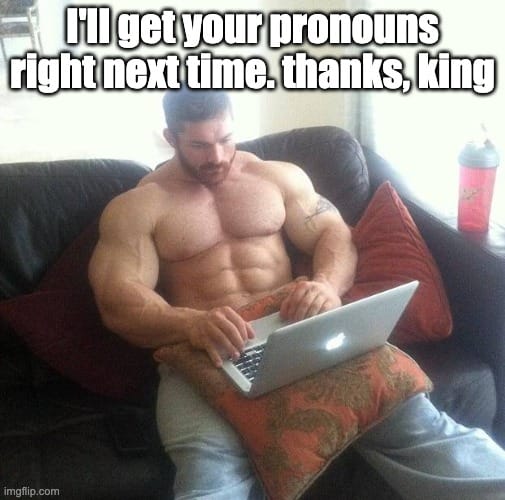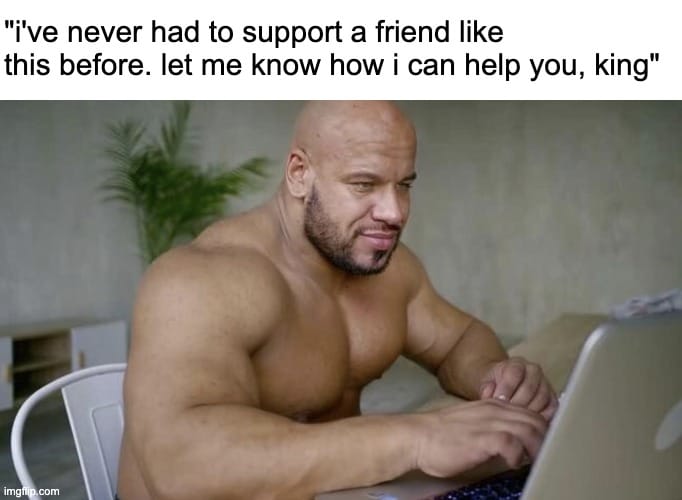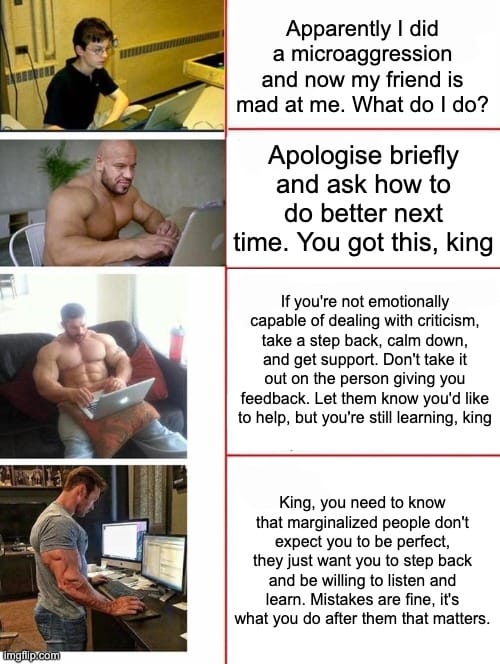The Stories Men Tell Themselves
Myth busted: being masculine doesn't have to mean being fretful and fragile.

A while ago I asked my friend Robbie if he'd be interested in writing a guest piece for the Cynic's Guide, for a few reasons. One is that he's a fantastic writer, and another is that he's got a unique and bloody valuable perspective on masculinity, having come out as a trans man in the last few years. (Robbie uses they/he pronouns.)
The original brief was for Robbie to talk about positive masculinity. It's something I'm interested in, because – from my position as an extremely cisgender bloke – a lot of masculine influence online seems to be negative. Or toxic, to give it the standard definition. If you're male and interested in any form of self-improvement, this stuff is inescapable. The solution given to men is so often "be more masculine" but the masculinity on offer from self-help gurus is defined mostly by what they oppose or are offended by: you've got the Jordan Petersons, Andrew Tates, and Elon Musks of the world opposing the existence of trans people and decrying the evils of feminism. This "anti-woke" wailing is so loud, and so constant. Screeching is the word that comes to mind, every time I see it. It's everywhere in the so-called manosphere, and it all seems so off, by any definition of masculinity – even many traditional ones. Where's the fortitude? The courage? The independence of thought? The resilience? The ability to weather change, or to undergo it? The masculinity of Tate, Peterson, Musk et al is so frail, so threatened. It's the polar opposite of stoicism, and it seems to testify to an inherent void, a lack of true inner strength.
I've seen Robbie display more strength and fortitude – "Danger" is, literally and figuratively, his middle name – in dealing with huge life upheaval than most men I know. I'm very grateful for this piece, and after reading it, I hope you feel the same way.
Dear Cynics,
This is my fourth time attempting to write this post. I sit down, write a few pages, and then eventually I think: what’s the point?
The opening paragraph will scare the people who need to listen away. Arguing on the basis of ‘men should do the right thing and change’ is hardly compelling.
The examples of my grief about toxic masculinity are hard to read. I’m too deep in my grief, jumping from one example to the next. The theory’s too confusing for people who are beginners to the topic.
I throw away the writing and start again.
I’ve spent lots of time telling the same narrative to men in my own life, and for the most part, nothing’s changed. What am I missing? What makes us convinced that masculinity is worth changing, when it’s oh-so-convenient not to change?
Here are my theories
If you’re left-wing, toxic white masculinity is a huge part of our political crisis
In case you missed it, brown women are leaving parliament often here in Aotearoa. Brown women who have experienced excessive harassment, death threats, and the pressures of representing a marginalized group of people. Many men (particularly: ignorant and privileged white men) don’t have to deal with these pressures, so they have a significantly greater chance of staying in politics. That’s right: we lose one of our greatest advocates for Gaza, but we keep the guy in parliament who hangs out with conspiracy theorists and anti-vaxxers, and said a bunch of sexist and abusive things about the former prime minister.
Toxic masculinity pushes marginalized people out of our communities
People of marginalized backgrounds have improved my life immensely, and continue to do so every day, with their perspective, their tenacity, and their sense of hope. They can improve yours too. But we’ve suffered enough micro-aggressions, trauma, passivity, and abuse apologists. If you want to keep us in your community, you need to understand the opposing forces keeping us out.

If you have toxic masculine tendencies, it’s probably making your life miserable
As bell hooks says, the first violence men commit is not against women. It’s to kill the emotional part of themselves. Living in a society that’s only going to continue to have less tolerance for toxic masculine behaviour, trying to deny the guilt and shame because being wrong is not an option, and depending on only your romantic partner for emotional support is a terrible way to live. No wonder men are so angry.
Most of my previous drafts dug deep into my history as a trans man, from getting bullied away from my male best friend at five and not having another male friend until age fifteen, to the violence of asking for emotional support from cis male peers, to realising all my cis-hetero male friends joking about being gay for each other is quite homophobic.
All served up through the structures of hegemonic toxic masculinity: homophobia, misogyny, suppressing emotions, being violent, competitive, and aggressive, punishing other men for being vulnerable, refusing to be wrong, and refusing self-care.
But I don’t think I want to write about being a gay transgender man deep in my grief from being punched about by toxic male behaviour. I don’t think I need to be the victim in this story after all.
I think that I understand what positive masculinity is.
It’s me. It could be you, too.
Positive masculinity is being able to step back and see where your privilege and power can be used and abused, and to make a choice not to do that. To use that privilege and power to make the world better, rather than to twist it into your service.
Is it any surprise that many positive masculine figures tend to be indigenous, Black, queer, migrant, or disabled? It’s because we are confronted with power dynamics from the get-go.
But this is the sort of rhetoric that sends the people who need to listen running. And these people, right now, are the ones deciding the future of our country.

Let’s go back to Saturday, October 14th, 2023
2023 brought a victory here in Aotearoa for the coalition of right-wing parties, campaigning on, amongst other things, the “pull yourself up by your bootstraps” rhetoric that everybody in society has the same equal chance, and that special treatment should not be afforded to Māori. They also aim to remove targeted climate taxes like the Auckland fuel tax, and the levies against high-emitting utes, and of course – cancelling the programme to reduce vehicle speed limits to safer levels.
A cracker of an article came out a month prior by The Spinoff’s Tara Ward, making fun of National MP Sam Uffindell for his comments that once a month, he “gives his wife a break” by going to the supermarket – “I get out there and take the shopping list off my wife and go out there and fill up the trolley”.
The tone of the latest election was less about two opposing sides, and more about a groundswell of people, particularly white, and particularly male, going “can’t you people just see I am doing enough already? I worked very hard for my car and house and sometimes I give my wife a break by going to the supermarket, and all the Maaris saying that I’m bad don’t get that I didn’t personally do anything to them”.
This type of narrative has worked remarkably well around the world – wearing down the “average citizen” by showing how stressful and unreasonable progressive politics, equity and inclusion can be. By changing all the names on the signs back to English, or saying transgender people are icky, then sitting back smugly while progressives shout about how bad and awful you are being, knowing that your average voter will get very tired of it all.
So while my previous drafts had far-reaching missives about how masculinity reinforces itself in a violent, hegemonic system, I think for today, we might just focus on one theme.

If we could address white male emotional fatigue, society would be a better place.
Because we’ve moved far beyond differing opinions. Most people agree, in principle, that inclusion is important and climate change is real. What we disagree on is whether it should be our problem to do anything about it. And for people where right wing ideology has very real benefits, the “it’s not your problem, those people are being unreasonable to you” narrative is very effective in capturing support and votes.
And it’s not just them.
There’s a lot of male leftists out there professing to care for marginalized people, while continuing to perpetuate the systems that oppress us. If you’ve ever seen the state of most people’s recycling bin you’ll know how pervasive and dangerous the idea of doing enough can be.
I don’t discuss ways to include a person like me who’s trans and queer in cis society. I bring up ways to include me, and men are at pains to make sure I know that they’re such a good guy, actually and I am doing a reasonable amount and none of that should be my problem.
These are the stories men tell themselves.
But maybe, if we want society to be better, men need to start telling themselves different stories.
Stories about listening, rather than speaking.
Stories about what we owe each other, rather than what society owes you.
It will be hard at first, but it gets better. It’s quite nice over here.
I bring up ways to include me, and men are at pains to make sure I know that they’re such a good guy, actually and I am doing a reasonable amount and none of that should be my problem.
I recognise this. I've definitely done that. I think everyone has, but where I think Robbie has nailed it is how often men do it, out of – if I'm being traditionalist about it – a very un-manly kind of fretfulness. The more you look, the more you see this; people tie themselves into impossible knots and distort their personalities in order to avoid even mild mental discomfort. And it doesn't have to be that way! Yes, some things are very hard work (and I believe that men shouldn't shy away from hard work) but a lot of this stuff is actually easy if you realise you can just let go of the needless mental baggage that today's toxic culture encourages you to accumulate.
For example, think of all the ink and bytes spilled over things like pronouns. You know what's a manly response to someone telling you what their pronouns are, or that their pronouns have changed? Hint: it's not getting your camera out and recording a literal scream into the void, because you were too fragile to countenance difference. Instead, consider saying "OK." Other options include "Yup" or "Oh yeah" or perhaps even "All good." It's fine! Likewise, if someone – having employed a lot of courage to do so – tells you that you've been approaching gender in kind of a shitty way, and it's making their life or your friendship difficult – then, again, the response isn't to be reflexively dismissive out of discomfort. Instead, have the courage to recognise the discomfort, consider what you've been told seriously, and to change.
It's one thing to say this, of course, and another thing to do it. But I'll do my best to stare down discomfort and do the needful. Let's go back to Robbie with this powerful statement:
Positive masculinity is being able to step back and see where your privilege and power can be used and abused, and to make a choice not to do that. To use that privilege and power to make the world better, rather than to twist it into your service.
To me, that's what masculinity – and self-improvement – is all about.





